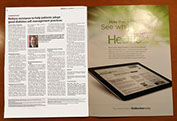“Reduce resistance to help patients adopt good DSM"
 By Eliot LeBow LCSW, CDE
By Eliot LeBow LCSW, CDE
Medical providers often view a patient’s resistance to diabetes self-management as a deliberate refusal to follow the provider’s prescribed course of action. Whether the directive is to change one’s diet or to take medication, the outcome of resistance is usually the same: The patient’s diabetes worsens, and the provider becomes increasingly frustrated.
The inherent problem with this perspective is that the provider tends to blame the patient, and many patients blame
themselves for not following the doctor’s recommendations. Many times...
“How to Understand, Identify, and Resolve Diabetes Burnout”
 By Eliot LeBow LCSW, CDE
By Eliot LeBow LCSW, CDE
“Diabetes Burnout” has become a buzzword in the past few years, but what is diabetes burnout? How does it impact your life, and how do you prevent it? Burnout occurs because diabetes is a highly stressful job, and diabetes management is never as simple as 1 + 1 = 2. Imagine it's time for dinner, and you’ve planned everything out perfectly: carbs: check, insulin: check, blood sugar: check! And you are good to go. But...
 By Eliot LeBow LCSW, CDE
By Eliot LeBow LCSW, CDE
There is a wide range of treatments for depression from psychotherapy to medications. For individuals with diabetes, Self-Management Education has therapeutic value, because better control reduces some symptoms of depression and builds self-esteem.
 By Eliot LeBow LCSW, CDE
By Eliot LeBow LCSW, CDE
The signs and symptoms of depression and high blood sugar can often overlap. Tell your mental health professional you have diabetes and describe your symptoms.
“Diabetes and Depression: Overview”
 By Eliot LeBow LCSW, CDE
By Eliot LeBow LCSW, CDE
Depression can impact anyone at any time and does not need to be a life long illness. It comes in a wide range of intensities from low-lying depression called dysthymia to the more debilitating, Major Depressive Disorder (MDD). An MDD can be an acute or a recurrent problem impacting all areas of life...
By Eliot LeBow LCSW, CDE
This article is going to address how self-defeating thinking perpetuates negative feelings around poor body image. The impact that these thoughts and feelings have on a person’s self-esteem can be paramount to the destruction of one's confidence and happiness. Before a person with weight issues can utilize strategies to lose weight and find a happier life, they need to understand what they are feeling and where the feelings are coming from. There are many common negative feelings and thoughts that surround being overweight while living with pre-diabetes or type 2 diabetes.
“Psychotherapist Who Knows Life with Diabetes”
By Ginger Vieira
The only people in my life growing up who came close to truly understanding what I was going through in life with diabetes were the psychotherapists. Who in one way or another helped me succeed despite the emotional and physical issues that come with diabetes. Don’t get me wrong, I had plenty of friends and family to talk too, but my therapist was the only person who could truly...
By Eliot LeBow LCSW, CDE
In the movies, the holidays always seem full of warm memories, quality time with loved ones, and gifts. But for many people, they may also be a time of stress and anxiety caused by financial pressures, time constraints, and menu limitations. If you’re a person living with type 1 or type 2 diabetes, this stress may have an impact both on your emotions and on the management of your blood sugar. Below are several tips I offer my clients that may help you – and your loved ones – enjoy a less stressful holiday season...
By John Parkinson
This natural defense mechanism can be problematic for people with diabetes to get their self-management under control. Psychotherapist Eliot LeBow, LCSW, explains what denial is and how providers can recognize it and get patients the help they need for it...
“Combating January's Perfect Storm”
The Holidays, New Year's Resolutions, and Winter
By John Parkinson
With the onset of January, medical providers can often see unhappy patients dealing with the after effects of the holidays, making beginning-of-the-year diabetes-management resolutions or battling the winter blues in the colder, northern latitudes. Psychotherapist Eliot LeBow, LCSW, discusses how providers can help patients set up realistic expectations and goals for their resolutions and identify patients who might be experiencing the winter blues.
The Hijacked Brain of the Diabetic
The Uncontrollable Urge to Eat and Eat Despite Knowing the Consequences
By Eliot LeBow LCSW, CDE
Hypoglycemic reactions cause many problems for diabetics, the least of which are diabetic comas. That is why it is so important to eat or drink something as soon as possible when a blood sugar reaction occurs. What happens next is quite problematic for the diabetic. The unconscious bingeing behavior that occurs can create more challenges for even the most astute diabetic.
Hunger Its The Human Experience
A closer look at how diabetics and non-diabetics become hungry
By Eliot LeBow LCSW, CDE
Previously I’ve written about how the body tricks the mind, causing diabetics to binge eat. So, I posed the question most people get asked all the time, “Are you hungry?” In this article, we will explore whether people with diabetes get hungry like everyone else. Do high blood sugars impact one’s ability to get hungry? If your blood sugars stay consistent at a normal level, will you be able to become hungry?
 If you are the parent of a child living with diabetes, life can be problematic, to say the least. My new book was designed to help parents manage the trials and tribulations of raising a child with diabetes. http://bit.ly/Parenting_CWD
If you are the parent of a child living with diabetes, life can be problematic, to say the least. My new book was designed to help parents manage the trials and tribulations of raising a child with diabetes. http://bit.ly/Parenting_CWD
Parenting Children with Diabetes, published by Rowman & Littlefield, offers parents a 360-degree view of what is happening to their child living with diabetes, providing unique tools, insight, and education to help parents and their children navigate diabetes management, communicate clearly and effectively, and live safely and healthfully.
Page 1 – Page 2
© 2011-2026 Eliot LeBow L.C.S.W., C.D.E., The information on this server including all images is proprietary and comprises legally protected subject matter belonging to psychotherapist Eliot LeBow, and is displayed on the basis of viewing only. All use, reproduction, and disclosure is prohibited without the prior consent of Diabetes Focused Therapist Eliot LeBow, including all registration marks: ® Diabetes Focused Psychotherapy, ® Helping People With Diabetes Thrive!, ® DiabeticTalks, ® DiabeticMinds, ® The Diabetic Diary. All rights reserved.
Office Locations: 323 West 96th street, NYC & Online Email: eliot.lebow@gmail.com • (917) 272-4829
Psychotherapist & Diabetes Specialist : Servicing all of New York State including Manhattan, Brooklyn, Queens, Staten Island, Long Island, and Westchester County.
